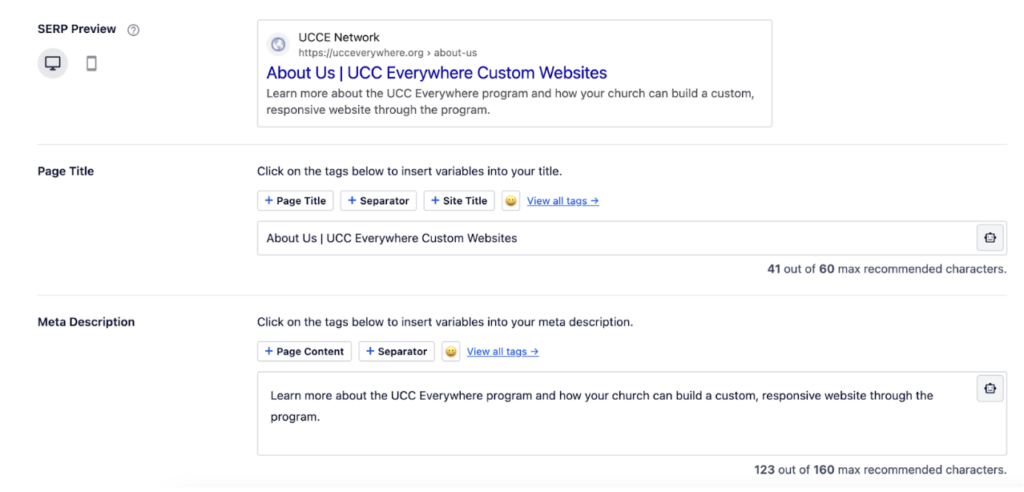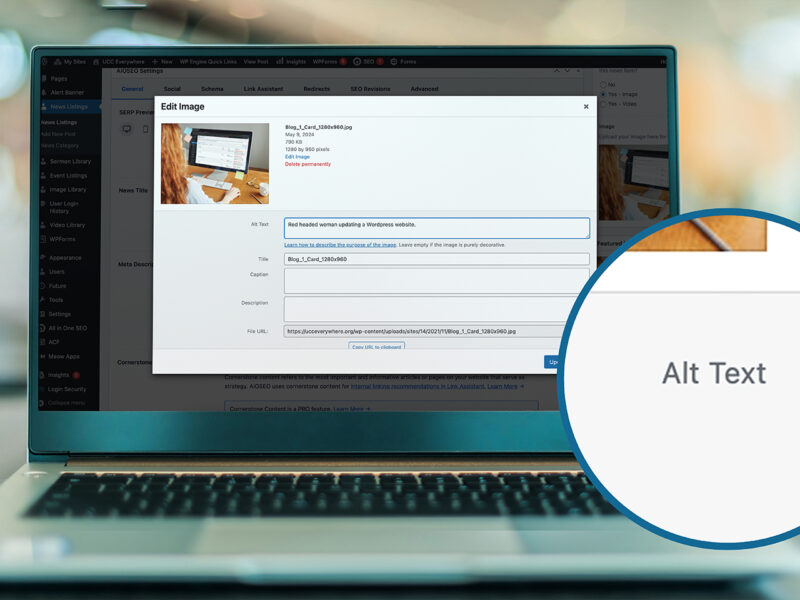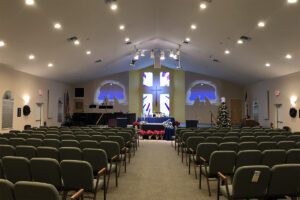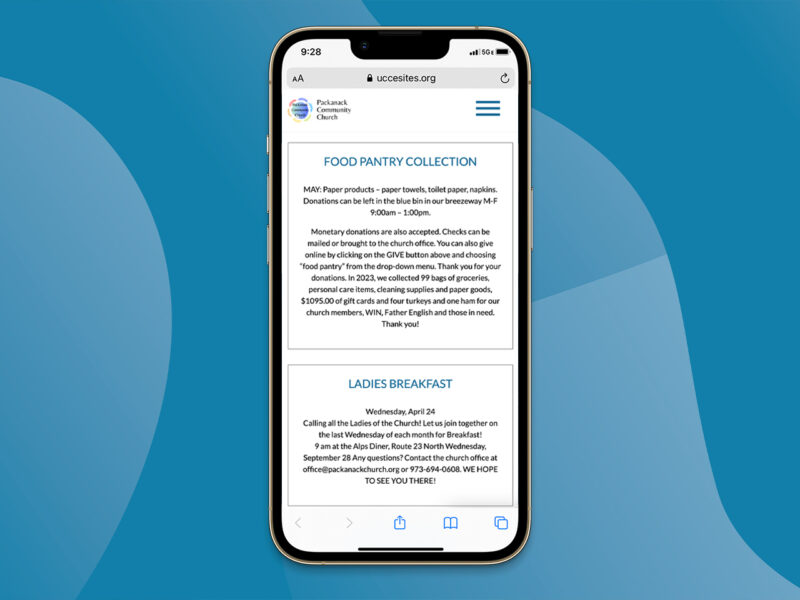(216) 736-2185 | Start Your Site Today!
(216) 736-2185 | Start Your Site Today!
Feb 06, 2025

When developing content for your church website, it’s important that it answers the questions the internet actually has. We’ve put together some information, considerations and tips to help guide you in developing content that addresses these questions.
There are some nonnegotiables that all church websites should provide visitors online, whether they be current or prospective members. These include:
Many visitors to your website may have never visited your church in real life, so it’s important to give them a sense of what your church is about and what worship will be like before they attend in person. Consider answering some of the following questions on your website. These could be answered in an FAQ for new members:
A website is meant to be for more than one audience, and it’s important to step into the shoes of the prospective member audience when developing content. While our list isn’t exhaustive, it’s a start for you to consider other questions this audience may have about your church, or questions they may not know to ask based on your church’s unique offerings.
SEO is an acronym for Search Engine Optimization. In 2025, every website should be optimized for search engines. This means consulting keyword tools such as Google Keyword Planner or SEMRush to see what words and phrases people are searching for and incorporating those keywords into your website. For more information on SEO, read this blog we published.
While doing general keyword research for your website, you can find questions that should be answered through your website. Keywords reflect what the internet wants to know, and it’s important that your website address them to not only rank highly on search engines but also to answer common questions associated with churches, or even theological questions.
This is where a blog can come in handy; not every question needs to be answered in an FAQ or a core page. If there’s a question you find while researching keywords online that requires a substantial answer, write a blog about it incorporating those keywords. Learn more about maintaining an effective blog.
We offer churches within the denomination state-of-the-art websites through the UCC Everywhere (UCCE) program. For a monthly or annual subscription fee, churches get their own site along with other digital marketing tools and support to make sure their message is reaching faith-seekers in their community via the appropriate virtual channels.
You can also pay an additional fee for content help. With this service, our professional copywriting and web strategy partners will help you develop and implement content on your new website. Participating churches will fill out a content intake form, which will then be edited, organized and turned into the site’s content, including SEO.
Jan 22, 2025

Websites are built on content, but while the words that make up content are important, how that content is organized is just as crucial to the success of a website. Here are some tips for how to organize your content.
The truth of the matter is that people rarely read all the content on a given webpage. We have been trained to skim websites in order to find the information most important to us, so it’s important that when organizing content for a church website, churches make it skimmable.
This partly relates to how content is written. On average, the internet reads at a middle school level, so using complex sentence structures can make content difficult for users to skim. When drafting content for your church website, make sure sentences are simple and word choices are clear.
However, being skimmable is more than just how the content is written. It’s also related to how content is presented visually. The most important things people need to know on a webpage should stand out from a design standpoint so that when they’re skimming, they pay attention to the most important points. These points should smoothly guide them through the content.
One way to create a clear visual hierarchy that prioritizes the most important pieces of content is to use headings. Headings separate content into clearly defined sections. They also give users a sense of what the content in that section is going to be about. An ideal heading is no longer than four to eight words, or around 70 characters. It can be a complete sentence, but the most high-level headings don’t need to be.
When writing content, keep headings in mind. Instead of having a webpage that is a large chunk of text, break it up into digestible sections separated by headings that explain what each section does. That way, since we know users are likely going to skim the page, the headings will guide them so that they still understand the main points of what you want them to get out of a webpage.
Headings are an important SEO tool. Search engines like Google use headings to index webpages and understand what they’re about. This means that when you add headings to a webpage, you’re increasing your chances of showing up as a result when people search for topics related to your content.
This means that it’s important to use SEO keywords in your headings. Keywords are specific words or phrases that a user enters into a search engine when looking for information, products or services. Search engines scan web pages for keywords to determine what will show up as the result of their search. Using keywords in your headings lets Google know what the most important keywords are for your webpage.
You can learn more about SEO keywords and how to find them on our blog.
Church websites built through UCC Everywhere (UCCE) have built-in design parameters for paragraphs and headings, so it’s easy and intuitive to organize content. For a monthly or annual subscription fee, UCC churches participating in UCCE get their own site along with other digital marketing tools and support to make sure their message is reaching faith-seekers in their community via the appropriate virtual channels.
Jan 22, 2025

Keeping your church website secure protects users and church administrators alike to make sure that everyone’s information is safe online. Learn more about cybersecurity and three simple ways you can make your church website more secure.
You may have wondered what the difference is between a website with HTTPS at the beginning of its URL and a website with HTTP. The difference is that the former has implemented TSL. TSL is a cybersecurity protocol that encrypts data. This means that when data is transmitted across the internet to or from your device, it is encrypted, or scrambled, so that anyone else who intercepts that data gets an indecipherable mess instead of the data you are receiving or sending.
This is important because people deal with private information on the internet on a regular basis. Imagine entering your social security number into a website and it being intercepted by a hacker on the internet. That could lead to terrible consequences. TSL ensures that this can’t happen.
TSL also authenticates websites, meaning it ensures that the owners of the websites you’re accessing are who they say they are.
To use TSL on your church website, you must have a TSL certificate (sometimes referred to as an SSL certificate, after the name of an older cybersecurity protocol), which is issued to the owner of a domain by a certificate authority. Some popular certificate authorities include Let’s Encrypt, Comodo, DigiCert and GlobalSign.
While obtaining a TSL certificate is a step you need to take to protect users of your church website, there are a couple of steps you need to take to protect yourself too. One is using strong passwords for all logins related to your church website (this most likely includes the accounts for your content management system, domain registrar and any associated email addresses).
According to the Cybersecurity & Infrastructure Security Agency, passwords need to be long, random and unique:
This will make it more difficult for hackers to access your church website through simply logging in. Make sure to store passwords securely using a tool such as a password manager. Some free password managers include NordPass, LogMeOnce, Proton Pass and Bitwarden.
In most content management systems, administrators of a website have the ability to add users who can then create their own credentials to access the site. Make sure you are selective with who you give administrative privileges to. Or, if you have a lot of people whom you would like to have access to your church website’s back end, only give them permission to access the parts of the site they will be updating.
For example, your church’s pastor may need full access to everything on the website, but maybe you have a volunteer whose responsibility is to update your blog, so your administrator can limit their access to just the blog portion of the back end of the site.
The United Church of Christ offers UCC churches a program called UCC Everywhere (UCCE) that allows them to maintain state-of-the-art websites that meet the needs of today’s churches. For a monthly or annual subscription fee, participating churches get their own site along with other digital marketing tools and support to make sure their message is reaching faith-seekers in their community via the appropriate virtual channels.
Nov 06, 2024

In today’s digital climate, search engine optimization (SEO) is a necessary tool for any website because search engines like Google are the primary means by which people find information online.
SEO is the practice of optimizing a website to improve its visibility on search engines. It’s important to keep in mind because when people are searching for churches in your area or for topics of interest covered on your website, you want your website to be the one they see.
While you can pay to have your website appear on search engines, the goal of SEO is to increase organic (non-paid) traffic by ensuring that it ranks higher in search results based on how well it addresses users’ searches. Keep reading to learn how you can better account for SEO when maintaining your website.
What are SEO keywords?
Keywords are the building blocks of SEO. They are specific words or phrases that a user enters into a search engine when looking for information, products or services. Search engines scan web pages for keywords to determine what will show up as the result of their search. This is why keywords are crucial for search engines: they help them understand the content of a web page and determine where it will rank in search results. The more relevant keywords your web page has, the higher up in a user’s search results it will be placed.
How do I find SEO keywords?
A basic first step you can take to make sure keywords are accounted for on your website is using a tool like Google Keyword Planner or SEMRush to see what keywords people are searching for online related to your church.
How these tools work is that you type in a keyword you think your audience would be searching for, and they will generate related keywords people are actually searching along with the amount of traffic those keywords get so you know which to prioritize.
For example, if you type “UCC church” into one of these tools, keywords such as “UCC churches near me,” “UCC church beliefs” or the names of other UCC churches in your area may populate.
How do I account for SEO keywords?
Because keywords tell search engines what pages are relevant, you need to include them in your website’s copy. This means adding them into headlines and paragraphs across your site based on what keywords you’ve identified for each page’s topic. Keyword research can be used to inform blog topics to write about as well. Learn more about how to best utilize a blog on your church’s website.
You also need to add keywords to SEO titles and metadescriptions. These are the titles and descriptions that appear in search results when your website ranks on a search engine, and they are included in what search engines scan when ranking your site. These can usually be updated in the settings for an individual page on your website. SEO titles and metadescriptions should be concise, descriptive and tell users what they should expect from a given page.

More about metadescriptions: The recommended length for an SEO title is 50 to 60 characters, and the recommended length for a metadescription is 155 to 160 characters. Search engines will usually cut off anything that goes beyond these lengths. Below is an example of an SEO title and metadescription that could work for the home page of the UCC, along with the keywords we used, which we found by typing “United Church of Christ” into SEMRush.
SEO Title: United Church of Christ | Home Page
Metadescription: Learn more about the mission, vision and beliefs of the United Church of Christ and find a United Church of Christ near you.
Keywords: church, united church of christ, church of christ near me
You should also include keywords in your URLs if possible.
What else factors into SEO?
While accounting for keywords is the best way to improve SEO, your site’s speed also impacts how it ranks on search engines. One simple way to improve speed is to make sure you optimize images across your website by making the files smaller. That way, large image files don’t have to be loaded on every page.
You should also make sure that your site is mobile-friendly. Optimizing your site for both desktop and mobile settings ensures it’s responsive to any device in which somebody might try to access your website.
In addition, your site needs to be secure, which requires getting an SSL certificate. This can be obtained through your domain registrar, such as GoDaddy. Your site also needs to be easy to navigate via clear internal links and be readable in terms of fonts, colors and spacing.
All of these things and more are the case for websites built through UCC Everywhere (UCCE), a program of the United Church of Christ that equips churches within the denomination with state-of-the-art websites. For a monthly or annual subscription fee, churches get their own site along with other digital marketing tools and support to make sure their message is reaching faith-seekers in their community via the appropriate virtual channels.
For an additional fee, you can also purchase UCCE with content support, where professionals will not only help produce content for each page of your website but also incorporate SEO best practices.
Sep 16, 2024

Church bulletins and social media are integral parts of a church’s communications, but space on a bulletin is limited, and social media posts need to be concise to keep followers’ attention. While many churches have church websites where they post information, they may not be utilizing them as effectively as they could. Websites should support their church bulletin and social media presence so that they all speak to one another. Here are three areas of your website you can use to support your church bulletin and social media.
News
News listings are a great way to provide additional context for items in your church’s bulletin to let church members know what is happening in your congregation. One way to connect your church website to your physical bulletins is to use QR codes, which church members can scan to read a full story related to a shorter headline or summary in a bulletin. That way, you can save paper while still providing an overview of what’s happening in your church, and if a headline is interesting to a church member, they can easily access more information hosted on your church website. You can use a free service such as https://qr.io/ to generate QR codes.
If you use a digital bulletin, connecting to your church website is even simpler as you can add call-to-action buttons and in-text links to send church members to the correct pages on your website for additional information.
News listings can also enhance your site’s search engine optimization (SEO) if updated regularly as it shows search engines that your site is up to date and well-maintained with relevant information. You can also add keywords to your news listings, which you can learn more about by reading our article on maintaining a successful blog.
Any time you post a news listing on your site, you should be sharing it on social media to make sure your followers are aware there is new content. Don’t just share it once: it may take a few tries for people to catch on, and that’s okay. Experiment with different post copy and visuals to accompany the news listing and see what works best for your audience.
Events
Events are always going to be a cornerstone of a church bulletin, but there isn’t always space to include every important detail beyond the names and times of the events. Details such as volunteers needed, a more specific location, links to register or even longer descriptions for more context can be important but lengthy for a printed piece. Adding a QR code to a bulletin can give church members a quick way to get to the event listing page of your church website to access further information for each event listed. You can even have QR codes for specific events that link to that event’s designated page on your website with all the information church members would need. Or, again, if using a digital bulletin, you can link directly to event pages from the bulletin itself.
As with news listings, new events should be shared to social media to keep followers updated on what’s going on at your church.
Sermons
Virtual service options are a necessity post-lockdown as churchgoers are used to having access to online sermons. Even if you don’t have the technology to livestream services, it’s a good idea to record sermons to post online afterwards for any church members who may have missed the service in-person, or even for prospective church members to explore past sermons to get a better feel of your church’s worship style.
Sermons can be shared to social media after being recorded, or many social media even have options to livestream directly to the medium. Experiment with what works best for your audience and what’s feasible given your church’s technology capabilities.
Creating synergy across your traditional and digital channels not only ensures that important content has a better chance of reaching your audience, no matter what their age, but also helps present your church as a modern and well-organized community.
The UCC Everywhere (UCCE) program is a state of the art church website builder for United Church of Christ churches that includes post types for all the listings above, which allows you to easily update them with all the relevant information you could need to communicate to church members and the greater community. Sign up now for a monthly or annual subscription fee.
Jul 29, 2024

When making a website for your church, it’s important to keep in mind web accessibility best practices. Web accessibility refers to inclusive practices that ensure that websites are usable by everyone, including people with disabilities. This involves making websites understandable and usable for all users, regardless of their physical or cognitive abilities.
Here are a few simple ways you can make your church website more accessible:
Set Alt Text for Images
Alt text is a short description of an image on a website that screen readers and other assistive technology can read to help people with blindness or other vision impairments understand what an image shows. It also contributes to search engine optimization (SEO) because search engines like Google will use alt text to understand what a web page is about to rank it among search results.
It’s important that alt text is descriptive enough to provide users with enough context for what an image is without having to see it, usually in one to two sentences. For example, if you have a photo of your church’s sanctuary, be sure to include high-level descriptions of who is in the photo along with any details about key features of the sanctuary that are featured.

Bad Example of Alt Text: The inside of a church.
Good Example of Alt Text: An empty church worship space with a nativity scene at the altar and a Christmas tree to the right.
Use Headings and Subheadings to Organize Content
Web accessibility isn’t just for people with disabilities but is also important when considering how to organize content in ways that are intuitive for everyone. Headings and subheadings are an easy way to make sure that information is grouped in ways that make sense with enough context for what those groupings are. Make sure you use concise, descriptive headings that people can skim to understand what is on a page, even without reading all of the content in each section. The headings alone should provide an outline of what a page is trying to tell a user.
Add Subtitles to Videos
Subtitles are important for people who are deaf or have hearing impairments, so make sure that any videos you have on your site have them. Most of the time, websites will embed videos from other services such as Youtube or Vimeo, which often have options for auto-generated subtitles. Make sure when uploading videos to other services that you go into the video settings to generate subtitles or manually add them for web accessibility purposes.
The UCC Everywhere (UCCE) program is a state of the art website builder for United Church of Christ churches. The platform includes websites already designed with web accessibility in mind, so you can get started with your site knowing it follows standard regulations.
For a monthly or annual subscription fee, UCC churches get their own site along with other digital marketing tools and support to make sure their message is reaching faith-seekers in their community via the appropriate virtual channels.
Jul 10, 2024

Most churches with websites don’t have an entire web development team on deck to help maintain their site. It’s often a volunteer or staff member responsible for keeping content up to date, and without an appropriate background, it can sometimes feel overwhelming to do so.
However, there are simple steps that whoever is maintaining their church’s website can take to ensure that their site is doing what it needs to do:
Conduct Regular Content Audits
Effective websites have content that is current and relevant, so it’s important that you regularly check to make sure that the content on your church website reflects what is actually going on at your church. This means going through each page and making sure nothing is outdated. You can conduct this audit on a monthly or even quarterly basis, though there are specific sections of your church website that will need more frequent updates, such as blogs and events.
Maintain a Blog
We’ve already written about the virtues of maintaining a blog on your church website and how to do so effectively. It’s important that if your church chooses to have a blog on its site, that it’s updated with content regularly. We recommend updating your blog at least weekly if not twice a week if possible. This isn’t to say that whoever is maintaining your church website as a whole is also responsible for writing every blog, but it’s important to understand how your site’s blog works and work with staff members and volunteers to get fresh content for it.
Update Your Church Events
Both current and prospective members of your congregation want to know what’s going on at your church, which is why one of the most important things for you to maintain on your church website is an updated list of upcoming events. Make sure it’s clear what the event is, where it’s being held, what time it’s being held and any other important details.
Keep SEO in Mind
Search engine optimization (SEO) is important in today’s digital climate. SEO is a strategic approach that enhances a website’s visibility on search engines like Google. Key elements of SEO include creating high-quality and relevant content, researching and implementing keywords and building backlinks.
If that sounds complicated, a basic first step you can take is using a tool like Google Keyword Planner to see what keywords or phrases people are searching for online related to churches, then making sure those keywords appear on your church website as you make content updates or publish blogs. That way, when people search for those keywords, your site shows up.
Building backlinks is also important. A backlink is simply a link from one website to another. Backlinks are crucial in SEO as they tell search engines that your church website is a valuable source of information because you’re linked from another credible source.
Some ways to build backlinks to your church website are to make sure your content is consistently updated and relevant and to reach out to other websites where you think your content might be relevant to link to. These sites could be:
You can also do research into Christian and church blogs that may have similar content to yours that could benefit from linking to your ideas as supplemental content.
Though this isn’t an exhaustive list of everything you can do to maintain your church website, it’s a good starting point to make sure key areas of your site are doing what they need to do to make your site as effective as possible.
The UCC Everywhere (UCCE) program is a state of the art website builder for United Church of Christ churches. The platform includes easy-to-update blogs, event listings and opportunities to enhance SEO. For a monthly or annual subscription fee, UCC churches get their own site along with other digital marketing tools and support to make sure their message is reaching faith-seekers in their community via the appropriate virtual channels.
Jun 11, 2024

Content for Outreach
Blogs are a simple way to create a repository for content that can then be shared through other outreach channels, such as newsletters and social media. These newsletters and posts will direct your audiences on these channels to your church website where your blogs can be structured in such a way that they encourage users to explore other parts of yoursite and learn more about your church. That’s why it’s so important that blogs have clear calls to action, or CTAs, that link to other parts of your church website.
Testimonies
Sharing personal stories and testimonials about faith and personal growth can profoundly impact readers, offering hope and encouraging reflection. Ask church members to share their testimonies if they’re comfortable. Giving members a voice on your church website will improve engagement and encourage the authors and their friends and family to share these stories through their own digital channels.
Education
Pastors can use blogs to expand on the ideas presented in services or even provide spiritual thought leadership on topics not covered on Sundays. This could include exploring theological concepts, Bible passages or ethical dilemmas in more depth, fostering a deeper understanding among readers to supplement what’s discussed during services.
Event Promotion
Upcoming events, services and community projects can be highlighted on a blog, ensuring greater visibility and participation. You can also write recaps after events so that when users visit your church website, they get a sense of what you’ve facilitated at your church for the community. Current members will also appreciate reading about events they may have missed, and adding photos to blogs of the events will engage those who attended.
SEO Enhancement
Regularly updated blogs provide fresh content, a key factor in improving a website’s visibility to search engines. This increases the likelihood of appearing in search results, thereby driving more organic traffic to the site. You can also optimize your blog’s visibility by including “keywords,” or commonly searched words and phrases, which you can find through tools like Google Keyword Planner or SEMRush. When your blog includes the appropriate keywords, it will show up in people’s search results when they search those keywords.
There is a wide variety of possibilities for the types of content you can share on your church website’s blog, and a good mix of content makes sure you’re reaching all kinds of people. The trick is to update your blog regularly and make sure you’re incorporating the appropriate keywords.
We offer United Church of Christ churches state-of-the-art websites through the UCC Everywhere (UCCE) program, which include easy-to-update blogs. For a monthly or annual subscription fee, UCC churches get their own site along with other digital marketing tools and support to make sure their message is reaching faith-seekers in their community via the appropriate virtual channels.
Visit https://ucceverywhere.org/ to learn more, request a demo or sign up today!
Jun 02, 2024

Sermons
It’s helpful for churches to maintain a page on their website with their past sermons, whether they be in PDF, video or audio form. This is a great way to not only give current members of your church a way to stay up-to-date on services if they are unable to attend in person, but also lets prospective new members know what you’re about and get a taste of what makes your worship unique by actually watching it.
Events
An updated events page allows current members to know what’s going on at your church and also shows prospective new members you have opportunities for them to get plugged in. Make sure to maintain an events page on your church website where you can input event names, times, locations, descriptions and photos to let people know what is happening. Events can include special worship services, community celebrations, church fundraisers or anything else you may be hosting.
Calendar
In addition to an entry for bigger special events, keep an updated digital calendar on your church website for regular events that may be helpful for current and prospective church members to be aware of. Google calendars are typically simple to embed on websites, though there are other tools you can use.
Blog
Church members want to be updated on the latest news. Maybe your church gets a new staff member, is launching a new fundraiser or has a member doing something amazing in the community you want to feature. A blog is a great way to write short stories to engage your online audience and let them know what’s going on at an organizational level when something exciting or new happens.
Blogs can also add search engine optimization (SEO) value to your church website. Consider using a tool like Google Keyword Planner to find what people online are searching for and address their faith-based questions with a quick written piece from your pastor.
Images
Keeping the images on your church website fresh is a simple way to show online visitors that your church is active. Updating the images across your site allows you to show new faces and events as they happen and makes for a more engaging church website experience. This is an easy way to ensure that your website reflects a thriving, modern church community.
Church websites require regular maintenance to do their job, so use this article as a reference in your ongoing website developments. It’s your turn to maximize your church website’s effectiveness and communicate with your congregation members and faith seekers.
We also offer churches within the denomination state-of-the-art websites through the UCC Everywhere (UCCE) program. For a monthly or annual subscription fee, churches get their own site along with other digital marketing tools and support to make sure their message is reaching faith-seekers in their community via the appropriate virtual channels. These websites make it easy to manage content from sermons to images to events so that keeping your website updated is intuitive and quick.
Visit https://ucceverywhere.org/ to learn more, request a demo or sign up today!